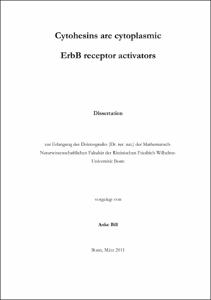Cytohesins are cytoplasmic ErbB receptor activators

Cytohesins are cytoplasmic ErbB receptor activators

| dc.contributor.advisor | Famulok, Michael | |
| dc.contributor.author | Bill, Anke | |
| dc.date.accessioned | 2020-04-16T23:05:55Z | |
| dc.date.available | 2020-04-16T23:05:55Z | |
| dc.date.issued | 12.07.2011 | |
| dc.identifier.uri | https://hdl.handle.net/20.500.11811/5005 | |
| dc.description.abstract | Signaling by ErbB receptors requires the activation of their cytoplasmic tyrosine kinase domains which is initiated by ligand binding to the receptor ectodomains. Up to now, cytoplasmic factors contributing to the activation of ErbB receptors have been unknown. This thesis introduces members of the cytohesin family of guanine nucleotide exchange factors as the first cytoplasmic ErbB receptor activators. Chemical inhibition or knock-down of cytohesins decreased ErbB receptor autophosphorylation and signaling whereas cytohesin overexpression stimulated receptor activation. Crosslinking experiments and studies with a constitutively dimerized EGFR construct showed that cytohesins act on already dimerized receptors. Cell-free reconstitution of cytohesin-dependent receptor autophosphorylation as well as monitoring EGFR conformation by fluorescence anisotropy microscopy indicate that cytohesins facilitate conformational rearrangements in the intracellular domains of dimerized receptors. Thus cytohesins may represent an additional layer of regulation of ErbB receptor activation which would allow the cell to modulate the number of activated ligand-bound receptors according to cellular needs. Consistent with cytohesins playing a prominent role in ErbB receptor signaling, cytohesins were found to be overexpressed in human lung adenocarcinomas. Furthermore, the overexpression correlated with increased activation of the EGF signaling pathway. Inhibition of cytohesins by the cytohesin-specific small-molecule inhibitor SecinH3 resulted in reduced proliferation and induction of apoptosis in EGFR-dependent lung cancer cells in vitro, as well as in tumor xenografts in mice. These findings underline the functional importance of cytohesin-dependent EGFR activation for tumor growth. Furthermore, chemical inhibition of cytohesins led to a strong reduction of glioblastoma cell proliferation. In order to optimize the inhibitory potential of SecinH3 , new Secin chemotypes were analyzed. In addition, a new assay for the screening of small molecules that interfere with cytohesin-catalyzed guanine nucleotide exchange on ARFs was established. The work in hand establishes cytohesins as an unprecedented, pathophysiologically relevant class of cytoplasmic conformational ErbB receptor activators and opens up new, entirely unexplored avenues for fighting ErbB receptor-dependent cancers by targeting not the receptors themselves but their activators. | en |
| dc.language.iso | eng | |
| dc.rights | In Copyright | |
| dc.rights.uri | http://rightsstatements.org/vocab/InC/1.0/ | |
| dc.subject | Cytohesine | |
| dc.subject | ErbB Rezeptoren | |
| dc.subject | EGFR | |
| dc.subject | Krebs | |
| dc.subject | Cytohesins | |
| dc.subject | ErbB receptors | |
| dc.subject | cancer | |
| dc.subject.ddc | 540 Chemie | |
| dc.subject.ddc | 570 Biowissenschaften, Biologie | |
| dc.title | Cytohesins are cytoplasmic ErbB receptor activators | |
| dc.type | Dissertation oder Habilitation | |
| dc.publisher.name | Universitäts- und Landesbibliothek Bonn | |
| dc.publisher.location | Bonn | |
| dc.rights.accessRights | openAccess | |
| dc.identifier.urn | https://nbn-resolving.org/urn:nbn:de:hbz:5n-25838 | |
| ulbbn.pubtype | Erstveröffentlichung | |
| ulbbnediss.affiliation.name | Rheinische Friedrich-Wilhelms-Universität Bonn | |
| ulbbnediss.affiliation.location | Bonn | |
| ulbbnediss.thesis.level | Dissertation | |
| ulbbnediss.dissID | 2583 | |
| ulbbnediss.date.accepted | 30.06.2011 | |
| ulbbnediss.fakultaet | Mathematisch-Naturwissenschaftliche Fakultät | |
| dc.contributor.coReferee | Lang, Thorsten |
Files in this item
This item appears in the following Collection(s)
-
E-Dissertationen (4337)




